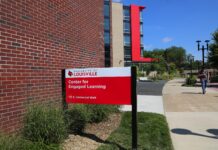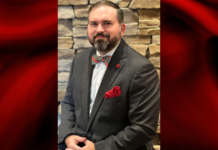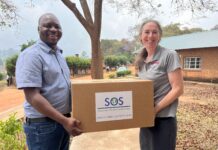“Bravo to you.”
Anna Petrova praised her new student Behnam, a teenager from Afghanistan, as he pinpointed C sharp on the keyboard.
Their lesson was halfway around the world from her UofL School of Music job as assistant professor of piano. The classroom was in Denmark at a Red Cross school for refugees, to which Behnam traveled an hour each day. The youth had taught himself English by watching YouTube videos.
A quick study, Behnam also learned the basics of piano and viola within two days of lessons last November with Petrova and her musical partner, violist Molly Carr.
“His passion is to study piano and learn to play music,” Petrova said. “We encouraged him to continue pursuing his dream and talked to his teachers to help find a local piano teacher who would volunteer to teach him. This path could be completely life-changing for him. We hold him dear and hope that we will see him play again one day.”
Behnam is one of many refugees Petrova and Carr encountered this past year with their multifaceted project Novel Voices, which seeks to aid refugees through music. With a financial award from the Music Academy of the West, Petrova and Carr conducted music workshops and concerts for refugee communities in Bulgaria, Denmark, the West Bank and the U.S.

The two wanted to use art to reach those living on the margins of local and global communities.
“We hoped to not only provide the momentary solace and empowerment that music and storytelling provide, but create spaces in which their unique stories are heard, connections are made and support is galvanized,” Carr said.
They traveled with Fernando Arroyo Lascurain, a film music composer from Los Angeles who collected cultural expressions that refugees shared, such as folk songs, dances and poetry. Lascurain used them as inspiration for a three-part musical composition the Carr-Petrova Duo will premiere at Carnegie Hall on Oct. 28 in New York City. The concert is dedicated to refugees.
Victoria Stevens and Skyler Knutzen, New York-based photographers and videographers, captured the team’s work and plan to use the footage for a documentary about refugees that will likely air at a refugee film festival, among other places.
“Through film and media nowadays we can make a much bigger impact,” Petrova said.
The project ultimately is meant to humanize refugees and draw attention to the real people caught in the complicated geopolitical issues of migration, which recently reached crisis levels largely due to the Syrian War, Petrova said. Globally, more people have been forced to flee their homes from conflict and crisis lately than at any time since World War II.
Novel Voices has already attracted international attention. The United Nations invited Petrova and Carr to speak about the project and perform a concert in October as part of the celebrations for the 70th anniversary of the Declaration of Human Rights.
“The project’s mission was to center the spotlight onto refugees as people, just like you and I,” she said.
In the Beginning
Carr and Petrova met as students at the Manhattan School of Music, where Petrova earned a Doctor of Musical Arts degree. Carr transferred to the Juilliard School, where she teaches now, and the two drifted apart. They ran into each other several years ago in a New York City park and decided to play together. Since then, they’ve performed around the world as the Carr-Petrova Duo, earning awards and critical acclaim.

Carr has worked with underserved populations as director of her own nonprofit Project: Music Heals Us and wanted to extend support to refugees. She reached out to Petrova to collaborate.
Petrova, whose native Bulgaria has struggled with increasing refugee populations, holds deep empathy for people escaping conflict in search of a better life. Her participation was a natural fit.
The two kicked off Novel Voices about the same time Petrova was hired to teach at UofL. Christopher Doane, then dean of the School of Music, said Novel Voices exemplifies Petrova’s collaborative abilities, which, along with her performance skills, made her an attractive candidate for the job.
The School of Music has a strong legacy of piano education throughout its 75-year history, harkening back to its first dean, concert pianist Dwight Anderson. The school needed someone who could carry that legacy forward.
“She is a fantastic player, great collaborator and an inspirational teacher,” Doane said. “Anna’s presence allows us to both connect with the past of the school and establish a new future based on her artistry and vision for what a solo pianist can learn here at UofL.”
Her busy international performance schedule, along with the Novel Voices project, gives her a worldwide platform to serve as an ambassador for UofL.
The Project
Petrova and Carr worked with refugee organizations to reach eight communities.
This presented its own challenges, Petrova said, as groups were enthusiastically receptive but had no precedent for working with musicians. That meant all the logistics fell to their team.
At each site, they performed works from artists who overcame adversity to become composers and musicians.
“We wanted to inspire them with their stories,” Petrova said.
They also gave group workshops, teaching basic components of music such as rhythm and melody; then the group created new compositions together. The duo offered private lessons to interested individuals.
The team met many memorable participants, such as Morteza, a teenage Afghan refugee living in Denmark. He rapped in his own language to music he’d made on his phone. He dreams of touring internationally as a rapper named Danger.

And, there were two boys, both named Mohammad, also living in Denmark, who were particularly eager. “Throughout the whole experience with teaching them piano, I was astonished by their innocence, naiveté and pureness — the child in them was not changed regardless of the harrowing situation they were in. It was hard for me to not think about that as they were completely immersed in the fun of learning the piano and music-making,” Petrova said.
There were challenges along the way too, Petrova said, like translating their lessons through various languages and filming in the Bulgarian camps, where Muslim participants didn’t want to appear on camera.
Wrapping Up
Carr and Petrova have completed the outreach portion of their project but foresee working with refugees in other ways.
“It never stops. It’s very hard to say this will be the end,” Petrova said. “We always see opportunity to do more.”
Next, they’ll release the duo’s debut album, “Novel Voices,” in September on the Melos label featuring compositions they played for the refugees and Lascurain’s original composition. They’re planning album release events in New York and in Louisville on Sept. 5 at the jazz club Jimmy Can’t Dance.
While Carr is in Louisville, they’ll do concerts and workshops for Kentucky Refugee Ministries, and Petrova’s UofL students will participate. She’ll talk to them about how they put the project together and how music can be used as a vehicle for social justice and outreach.
Looking back, it’s hard to say what the lasting impact of the project will ultimately be, Petrova said. But she feels they were able to reach people in a personal way, help fan their creative flames and foster hope for a better tomorrow.
“Without sounding too ambitious, I do believe we have inspired children and refugee audiences to be more open and use their creative talents,” Petrova said. “We haven’t alleviated the refugee problem, obviously, and that was not the goal of the project. I haven’t been naive enough to think that through concerts we can change the reasons there are refugees … But for the human impact, one-on-one, I believe we’ve made a small impact on some people’s lives.”

Photos by Victoria Stevens. Illustration by Paul Blow.






























